非谓语动词句型总结
非谓语动词句型

高考英语必备57个非谓语动词句型1.adj+enough to do sth.足够…去做某事;2.refuse to do sth.拒绝去做某事;3.There be +主语+doing sth.【①.正在进行;②.性质/状态/条件】4.There be +主语+to do sth.【①.未发生;②.目的】5.It be +adj+for sb to do sth.【adj修饰to do sth】6.It be +adj+of sb to do sth.【adj修饰sb】7.介词+doing【主动形式】;介词+being done.【被动形式】8.Keep doing sth.保持做某事;9.Sb spend time/money (in) doing sth.某人花费时间/金钱做某事。
10.It takes/took/cost sb time/money/effort to do sth.做某事花费某人时间/金钱/精力。
11.Be (more/less) likely to do sth.可能做某事。
12.Be required to do sth.被要求做某事。
13.Avoid doing sth.避免做某事;avoid being done.避免被….14.Allow sb to do sth.允许某人做某事;be allowed to do sth.被允许做某事。
15.There is no point (in) doing sth.做某事没有意义。
16.determine to do sth./be determined to do sth./make a determination to do sth.17.offer to do sth.主动提出去做某事。
18.fail to do sth.未能做某事。
19.feel like doing sth.想要做某事。
20.practice doing sth.练习做某事。
非谓语动词考点总结归纳
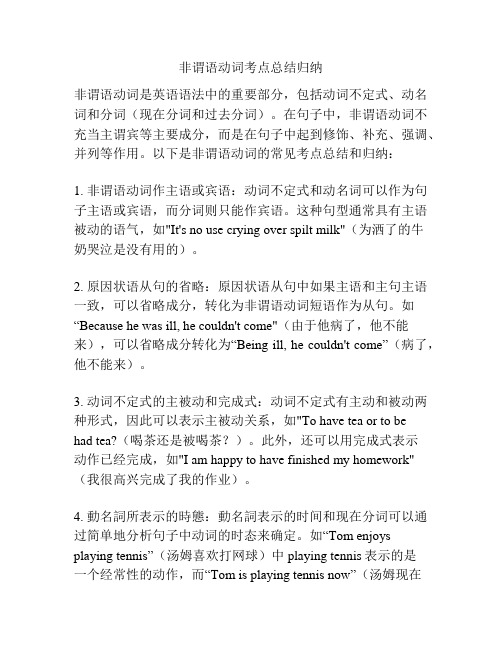
非谓语动词考点总结归纳非谓语动词是英语语法中的重要部分,包括动词不定式、动名词和分词(现在分词和过去分词)。
在句子中,非谓语动词不充当主谓宾等主要成分,而是在句子中起到修饰、补充、强调、并列等作用。
以下是非谓语动词的常见考点总结和归纳:1. 非谓语动词作主语或宾语:动词不定式和动名词可以作为句子主语或宾语,而分词则只能作宾语。
这种句型通常具有主语被动的语气,如"It's no use crying over spilt milk"(为洒了的牛奶哭泣是没有用的)。
2. 原因状语从句的省略:原因状语从句中如果主语和主句主语一致,可以省略成分,转化为非谓语动词短语作为从句。
如“Because he was ill, he couldn't come"(由于他病了,他不能来),可以省略成分转化为“Being ill, he couldn't come”(病了,他不能来)。
3. 动词不定式的主被动和完成式:动词不定式有主动和被动两种形式,因此可以表示主被动关系,如"To have tea or to behad tea?(喝茶还是被喝茶?)。
此外,还可以用完成式表示动作已经完成,如"I am happy to have finished my homework"(我很高兴完成了我的作业)。
4. 動名詞所表示的時態:動名詞表示的时间和现在分词可以通过简单地分析句子中动词的时态来确定。
如“Tom enjoys playing tennis”(汤姆喜欢打网球)中playing tennis表示的是一个经常性的动作,而“Tom is playing tennis now”(汤姆现在正在打网球)中playing tennis则表示现在正在进行的动作。
5. 分词作定语:现在分词和过去分词经常用作定语修饰名词,如shining stars(闪闪发亮的星星)、a book written by Hemmingway(海明威写的一本书)。
高中英语非谓语的知识点总结
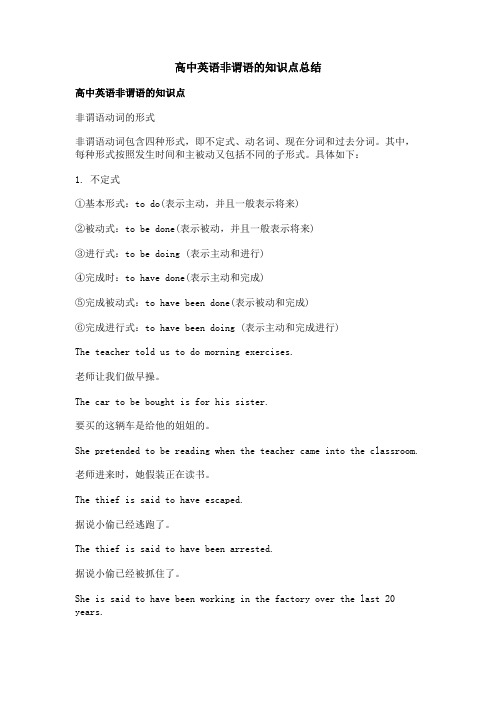
高中英语非谓语的知识点总结高中英语非谓语的知识点非谓语动词的形式非谓语动词包含四种形式,即不定式、动名词、现在分词和过去分词。
其中,每种形式按照发生时间和主被动又包括不同的子形式。
具体如下:1. 不定式①基本形式:to do(表示主动,并且一般表示将来)②被动式:to be done(表示被动,并且一般表示将来)③进行式:to be doing (表示主动和进行)④完成时:to have done(表示主动和完成)⑤完成被动式:to have been done(表示被动和完成)⑥完成进行式:to have been doing (表示主动和完成进行)The teacher told us to do morning exercises.老师让我们做早操。
The car to be bought is for his sister.要买的这辆车是给他的姐姐的。
She pretended to be reading when the teacher came into the classroom.老师进来时,她假装正在读书。
The thief is said to have escaped.据说小偷已经逃跑了。
The thief is said to have been arrested.据说小偷已经被抓住了。
She is said to have been working in the factory over the last 20 years.据说在过去的20年里,她一直在这家工厂工作。
2. 动名词①基本形式:doing (表示主动)②被动式:being done(表示被动)③完成式:having done(表示主动和完成)④完成被动式:having been done(表示被动和完成)Travelling in space by ordinary people will be common in the future.在未来,普通人在太空旅行将会是普遍的事情。
非谓语动词用法总结

非谓语动词用法总结非谓语动词主要包括不定式、动名词和现在分词。
为了区分这三种不同的非谓语动词的用法和含义,我们将分别从三种非谓语动词在句子中做主语、宾语、宾语补足语、定语、状语、表语以及一些特殊结构句型等角度来区分其用法和细微含义。
接下来,小编给大家准备了非谓语动词用法总结,欢迎大家参考与借鉴。
非谓语动词用法总结1.不定式和动名词作主语的区别(1)动名词作主语通常表示抽象动作;而不定式作主语表示具体动作。
Smoking is prohibited(禁止)here.这里禁止抽烟。
(抽象)It is not very good for you to smoke so much.你抽这么多烟对你身体很不好。
(具体)(2)动名词作主语时,通常用以表示一件已知的事或经验。
不定式短语通常用来表示一件未完成的事或目的。
Climbing mountains is interesting.爬山很有趣。
(经验)Driving a car during the rush hour is tiring.在高峰时刻开车令人厌烦。
(经验)(3)不定式做主语,一般用it当形式主语,把作主语的不定式短语后置。
It took me only five minutes to finish the job.2.不定式、动名词和分词作表语的区别(1)不定式作表语1)不定式作表语一般表示具体动作,特别是表示将来的动作。
To do two things at a time is to do neither.--次做两件事等于未做。
What I would suggest is to start work at once.我的建议是立刻开始干。
2)如果主语是不定式(表示条件),表语也是不定式(表示结果)。
To see is to believe.百闻不如一见。
To work means to earn a living.工作就是为了生活。
3)如果主语是以aim, duty, hope, idea, happiness, job,plan,problem,purpose,thing,wish等为中心的名词,或以what引导的名词性从句,不定式作表语是对主语起补充说明作用。
非谓语动词短语句型

非谓语动词短语句型一、概述非谓语动词是英语语法中的重要部分,包括动词不定式、动名词和分词。
这些非谓语动词在句子中可以作为主语、宾语、定语、状语等成分,使句子更加丰富和灵活。
掌握非谓语动词的用法和句型,对于提高英语表达能力和理解复杂句子结构具有重要意义。
二、动词不定式句型To do sth. 作为主语:To learn a foreign language is not easy.(学习一门外语不容易。
)To do sth. 作为宾语:I like to eat apples.(我喜欢吃苹果。
)To do sth. 作为定语:The book to be published next month is very popular.(下个月要出版的那本书很受欢迎。
)To do sth. 作为状语:To save time, I usually take the bus to work.(为了节省时间,我通常乘公共汽车去上班。
)三、动名词句型Doing sth. 作为主语:Reading books is my favorite hobby.(读书是我最喜欢的爱好。
)Doing sth. 作为宾语:I enjoy watching movies.(我喜欢看电影。
)Doing sth. 作为定语:The swimming pool is a great place to relax.(游泳池是一个放松的好地方。
)Doing sth. 作为状语:Playing sports helps me stay healthy.(运动帮助我保持健康。
)四、分词句型Having done sth. 作为状语:Having finished my homework, I went to bed.(完成作业后,我睡觉了。
)Done sth. 作为状语:Seen from the top of the mountain, the city looks very beautiful.(从山顶看,这个城市非常美丽。
英语非谓语动词用法总结(完整)
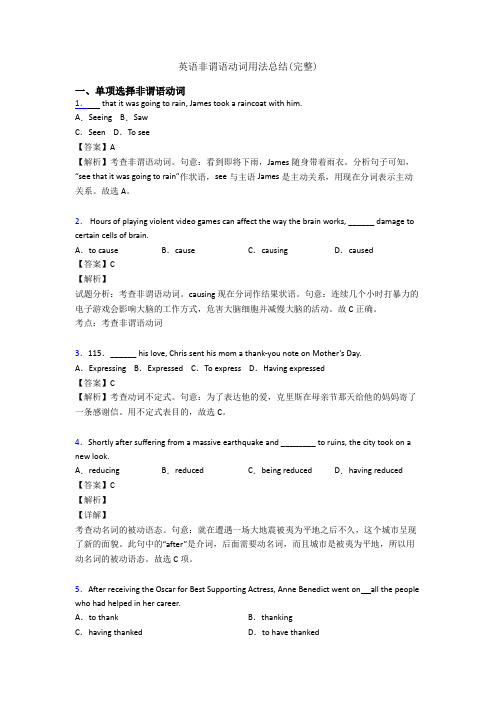
英语非谓语动词用法总结(完整)一、单项选择非谓语动词1. that it was going to rain, James took a raincoat with him.A.Seeing B.SawC.Seen D.To see【答案】A【解析】考查非谓语动词。
句意:看到即将下雨,James随身带着雨衣。
分析句子可知,“see that it was going to rain”作状语,see与主语James是主动关系,用现在分词表示主动关系。
故选A。
2. Hours of playing violent video games can affect the way the brain works, ______ damage to certain cells of brain.A.to cause B.cause C.causing D.caused【答案】C【解析】试题分析:考查非谓语动词。
causing 现在分词作结果状语。
句意:连续几个小时打暴力的电子游戏会影响大脑的工作方式,危害大脑细胞并减慢大脑的活动。
故C正确。
考点:考查非谓语动词3.115.______ his love, Chris sent his mom a thank-you note on Mother’s Day. A.Expressing B.Expressed C.To express D.Having expressed【答案】C【解析】考查动词不定式。
句意:为了表达他的爱,克里斯在母亲节那天给他的妈妈寄了一条感谢信。
用不定式表目的,故选C。
4.Shortly after suffering from a massive earthquake and ________ to ruins, the city took on a new look.A.reducing B.reduced C.being reduced D.having reduced 【答案】C【解析】【详解】考查动名词的被动语态。
高考英语常用句型以及例句-4非谓语动词句型

第四组非谓语动词句型1.感官动词+sb./sth.+do/doing/done......They knew her very well.They had seen her grow up form childhood.他们非常了解她。
他们是看着她长大的。
2.have/make/get+sb./sth.+done 把/使......(办完)It is important to have your eyes examined regularly to check for any sign of eye disease that may not have any symptom.定期检查眼睛看看是否有眼疾症状很重要。
3.hae/make/let+sb.+do sth. 让某人做某事I made him do it.我叫他做这件事的。
4.can’t have sb. doing sth. 不允许某人做某事I can’t have you doing nothing all day.我不能让你整天无所事事。
5.keep/make/hear......+sb./sth.+doing/doneAt last I succeeded in getting my car moving slowly.最后,我终于成功地让我的车子慢慢移动了起来。
6.get(s)+过去分词/形容词If you happen to get lost in the wild,you’d better stay where you are and wait for help.如果你碰巧在野外迷路了,你最好待在原地等待救援。
7.......only/merely/simply/just+动词不定式Tom took a taxi to the airport,only to find his plane high up in the sky.汤姆乘坐出租车去了机场,却发现他要乘坐的飞机早已经高高地飞在了天上了。
(完整版)非谓语的用法总结
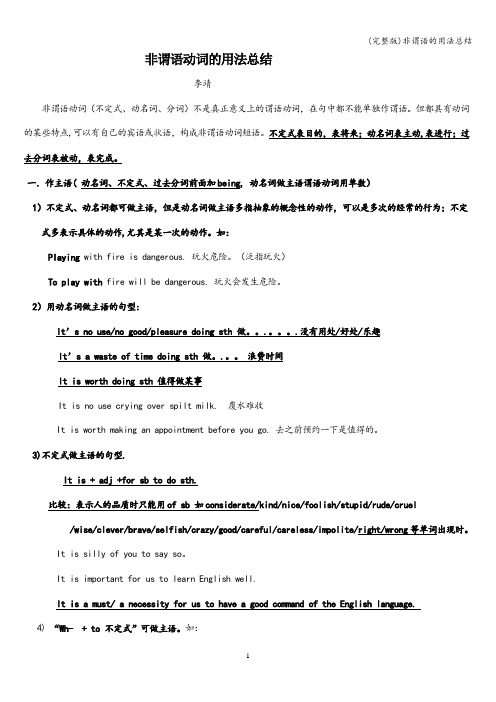
非谓语动词的用法总结李靖非谓语动词(不定式、动名词、分词)不是真正意义上的谓语动词,在句中都不能单独作谓语。
但都具有动词的某些特点,可以有自己的宾语或状语,构成非谓语动词短语。
不定式表目的,表将来;动名词表主动,表进行;过去分词表被动,表完成。
一.作主语( 动名词、不定式、过去分词前面加being, 动名词做主语谓语动词用单数)1)不定式、动名词都可做主语,但是动名词做主语多指抽象的概念性的动作,可以是多次的经常的行为;不定式多表示具体的动作,尤其是某一次的动作。
如:Playing with fire is dangerous. 玩火危险。
(泛指玩火)To play with fire will be dangerous. 玩火会发生危险。
2)用动名词做主语的句型:It’s no use/no good/pleasure doing sth 做。
.。
.没有用处/好处/乐趣It’s a waste of time doing sth 做。
.。
浪费时间It is worth doing sth 值得做某事It is no use crying over spilt milk. 覆水难收It is worth making an appointment before you go. 去之前预约一下是值得的。
3)不定式做主语的句型.It is + adj +for sb to do sth.比较:表示人的品质时只能用of sb 如considerate/kind/nice/foolish/stupid/rude/cruel /wise/clever/brave/selfish/crazy/good/careful/careless/impolite/right/wrong等单词出现时。
It is silly of you to say so。
It is important for us to learn English well.It is a must/ a necessity for us to have a good command of the English language.4) “Wh- + to 不定式”可做主语。
非谓语动词的用法归纳

非谓语动词Non-Finite Verb I 非谓语的三种形式II 本章要点I非谓语语法点分述一、不定式to do1.不定式结构作主语➢To see is to believe.➢It is better to see something once than to hear about it a hundred times.a.在很多情况下,特别是在口语中,常采用先行it代替主语,而把不定式后置:➢It’s a great pleasure to be here.➢It is not an easy thing to master a language.★区分用法★1)直接用不定式做主语的句子显得更加正式。
2)如主语和表语都是to do,则只能采用第一种形式。
➢对敌人仁慈就是对人民残忍。
3)如是疑问句或感叹句,则只能采用第二种形式。
➢What is it like to be there?➢What a joy it was to read Barak’s book!b.用It is+形容词作表语时,由于逻辑主语不同导致的for和of的区别。
(1)for sb.句型中的形容词一般为表示事物的特征特点,表示客观形式的形容词,如:difficult, interesting, easy, impossible等。
.(2)of sb.句型中的形容词一般为表示性格、品德、心智能力,表示主观感情或态度的形容词,如:good, kind, nice, clever, foolish等。
★小试身手★1)To be fond of dancing was a certain step towards falling in love.2)对他来说,学两门外语是很困难的。
3)你能这么说很有礼貌。
★真题试炼★1)It’s important _____ the piano well.A. of him to playB. for him to playC. of him playingD. for him playing2)It’s wrong _____ her like that.A. of you to treatB. for you to treatC. of you treatingD. for you treating2.不定式结构作表语主语和表语都是不定式(其含义往往一是条件,一是结果),如:➢To be kind to the enemy is to be cruel to the people.➢To do that would be to cut the foot to fit the shoe.3.不定式结构作动词宾语(见表格附录)4.不定式结构作定语★小试身手★1)了解一个人最好的方法是和他/她生活一段时间.2)你有什么可以吃的东西吗?3)许多老人找不到可以安度晚年的地方.5.不定式结构作状语基本用法:不定式结构可以作状语,修饰动词、形容词、副词等表示目的、原因、结果、条件等。
英语非谓语动词用法总结(完整)
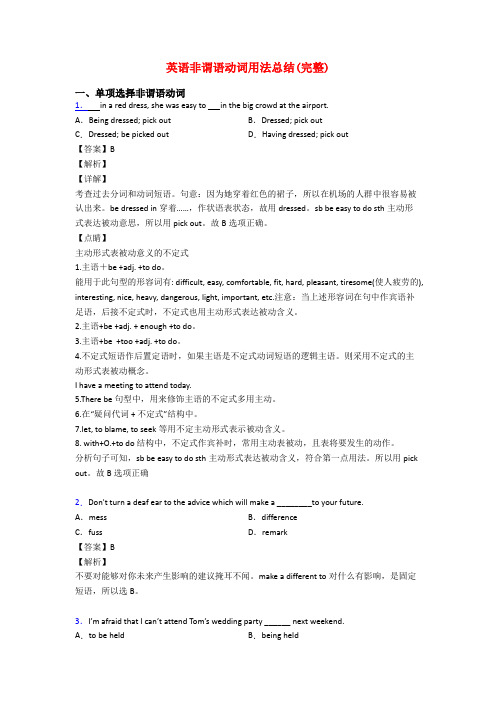
A.exposedB.to exposeC.exposingD.being exposed
【答案】A
【解析】
试题分析:考查非谓语动词。本题考查短语be exposed to暴露与……。句意:处理这种化学物质时要小心,因为它暴露在阳光下时会爆炸。故A正确。
【点睛】
不定式和现在分词均可用结果状语,但两者用法有区别:现在分词用作结果状语,通常表示一种自然的结果,即属预料之中的事;不定式用作结果状语,主要表示没有预料到的情况或结果,即属预料之外的事。
15.--You’ve made great progress in your studies of English, haven’t you?
8.Volunteering gives you a chance _______ lives, including your own.
A.changeB.changing
C.changedD.to change
【答案】D
【解析】
【详解】
考查非谓语动词。句意:做志愿者工作给你一个改变生活的机会,包括你自己的生活。名词chance后面通常用动词不定式作后置定语。故选D。
12.In response to the citizens’ concern, the government claimed ______ measures to attend to the increasingly serious smog in the past two months.
A.taking B.to take
非谓语动词笔记

非谓语动词非谓语动词指不能单独作谓语,但同时仍保留动词某些特征的动词形式。
非谓语动词主要有不定式、V-ing形式、V-ed形式三类。
它们没有人称和数的变化,但是有的有时态和语态形式变化,还可以有自己的宾语、状语、逻辑主语等。
1、定义:在句中不充当谓语的动词称作非谓语动词。
2、形式:doing---动名词to do---不定式分词---现在分词doing 过去分词---done3、后跟doing型(偏执型)a) 动词+doing:例:enjoy, keep, be busy, finish, mind, can`t help, spend+时间+doing。
b) 介词+doing:例:after, before, feel like注意:“to”作为介词时后跟doing。
例:I go to school.“to”作为不定式时后跟do.例:I want to read the English books.常考短语:look forward to doing----期盼。
例:I look forward to receiving your letter.Be used to doing----习惯于。
例:I am used to walking my bear at 24.Prefer doing A to doing B----宁愿做…也不愿做...例:I prefer reading English books to watching TV.c) 后跟doing表被动在need, want, require, be worth后加doing表示被动例:My bag needs mending.4、后跟to do 型(偏执型)a) 动词+to do 例:I ask you to go swimming with a shark.记忆口诀:要想拒绝命令,决定告诉教警。
Ask, want, refuse, order, decide, tell, teach, warn注意:否定形式在to do 前加notb) 特殊疑问词+to do=从句注意why后加裸不定式,省略to例:I don`t know whether to buy it.c) 后跟裸不定式省略to记忆口诀:一感,二听,三使,四看(snow),半帮助Feel, listen to/hear, make/let/have, see/notice/observe/watch, help使用规则:1) 这些动词后跟to do时,省略to.例:No one can make my cry.2) 其中一感,二听,四看,半帮助动词,后也可加do/doing.例:I see him steal / stealing.3) 当这些词用于被动时,后跟to do(被动语态恢复to) 例:He was made to cry.语法重点:无头鬼句型一北京的一个年轻人厌倦了睡在地板上。
非谓语动词语法详解

非谓语动词语法详解.一.主语.1. 动名词和不定式作主语时,都可以用it 作形式主语,构成句型:it +be +表语+to do /doing sth. 当用作表语的是important , essential, necessary , unnecessary, possible, impossible, easy , difficult 等表示客观情况的形容词时,常用不定式作主语;当用作表语的是no use, no good, useful, useless, worth, worth while, a waste of time 等表主观短语时,常用动名词作主语。
Eg: it is important for us students to learn english well.It is impossible for them to finish the work within two hours.It is no use arguing with him about the matter.I don’t think it’s much good writing to him.It’s a waste of time trying to persuade her to agree.2.动名词短语作主语时表示抽象动作,通常不与特定的动作执行者联系在一起;不定式作主语表示具体动作,往往与特定的动作执行者联系在一起。
Eg: lying is wrong. (泛指)To lies is wrong. (特指)It’s no use crying over split milk.He realized that it was no use to go on like this.二.. 非谓语作宾语1.1)Would you mind lending me your English dictionary for a while?2) She can’t help crying after she listened to the sad story .3) I suggested trying it in a different way .4) I ‘ve been looking forward to hearing from you for a long time.5) He insisted on finishing the work before going home.6) Upon returning from Beijing, he went to visit his friends.7) He took a great delight in helping others.8) he didn’t metion having met me .9) I still remember having ever worked with him .10) I enjoyed watching TV program in the evening.11) the car needs reparing .12) the problem deserves explaining .13) This phonomenon requires studying carefully.14) The book is worth reading We don’t allow smoking in the classroom.He dislikes seeing her again.Mary is considering going abroad.Have you finished checking these machines?Working conditions keep improving, and production keeps going up , as well. He really appreciates having time to relax.He is fond of learning English.She left without telling me.1) I need to fetch a tape from a friend2) do you want me to find one stamp for you ?3) I have arranged to meet here at 10:00.I’d prefer to walk there this morning.I’d hate to leave you like that .She’d like to chat with university students.扩:1) agree , afford , aim , apply , arrange, ask , choose, claim, decide, demand, determine, fail , hope , learn , offer, plan , pretend, promise, refuse, want 等后只用to do .2)admit , allow , appreciate , avoid , consider, deny , dislike, encourage,enjoy, escape , excuse, finish , forbid , imagine, keep , mind , permit , practice 等词后只用doing3)stop doing sth / to do sth 停止做某事/停下来去做某事remember doing sth/ to do sth. 记得做过某事/记住要去做某事forget doing sth/ to do sth 记了做过某事/ 忘了做某事regret doing sth / to do sth 后悔做过某事/ 遗憾地。
高中英语非谓语动词的常用句型大全

资料收集于网络,如有侵权请联系网站删除只供学习与交流高中英语非谓语动词常用句型大全一、接to do而不接doing)的常用动词1.afford to do sth. 负担得起做某事2.agree to do sth. 同意做某事3.choose to do sth. 选择做某事4.decide to do sth. 决定做某事5.demand to do sth. 要求做某事6.determine to do sth. 决心做某事= be determined to do sth.7.expect to do sth. 期待做某事8.hope to do sth. 希望做某事9.manage to do sth. 设法做某事10.offer to do sth. 主动提出做某事11.plan to do sth. 计划做某事12.pretend to do sth. 假装做某事13.promise to do sth. 答应做某事14.refuse to do sth. 拒绝做某事15.arrange to do sth.安排做某事16.wish to do sth. 希望做某事17.aim to do sth. 打算做某事18.fail to do sth. 未能做某事19.long to do sth. 渴望做某事20.happen to do sth. 碰巧做某事21.seem to do sth. 仿佛做某事22.struggle to do sth. 努力做某事23.strive to do sth 努力做某事24.attempt to do sth 试图做某事25.seek to do sth 试图做某事二、接to do作宾补的常用动词1.advise sb. to do sth. 建议某人做某事2.allow sb. to do sth. 允许某人做某事3.ask sb. to do sth. 请(叫)某人做某事4.beg sb. to do sth. 请求某人做某事5.cause sb. to do sth. 导致某人做某事mand sb to do sth. 命令某人做某事7.drive sb. to do sth . 驱使某人做某事8.enable sb. to do sth. 使某人能做某事9.encourage sb. to do sth. 鼓励某人做某事10.expect sb. to do sth. 期望某人做某事11.forbid sb. to do sth. 禁止某人做某事12.force sb. to do sth. 强迫某人做某事13.get sb. to do sth. 使(要)某人做某事14.help sb. to do sth. 帮助某人做某事15.invite sb. to do sth. 邀请某人做某事16.leave sb. to do sth. 留下某人做某事17.like sb. to do sth. 喜欢某人做某事18.need sb. to do sth. 需要某人做某事19.oblige sb. to do sth. 迫使某人做某事20.order sb. to do sth. 命令某人做某事21.permit sb. to do sth. 允许某人做某事22.persuade sb. to do sth. 说服某人做某事23.prefer sb. to do sth. 宁愿某人做某事24.request sb. to do sth. 要求某人做某事25.remind sb. to do sth. 提醒某人做某事26.teach sb. to do sth. 教某人做某事27.tell sb. to do sth. 告诉某人做某事28.want sb. to do sth. 想要某人做某事29.warn sb. to do sth. 警告某人做某事30.wish sb. to do sth. 希望某人做某事31.convince sb. to do sth. 说服某人做某事32.inspire sb. to do sth激励某人做某事三、接doing(不接to do)作宾语的常用动词1.admit doing sth. 承认做某事2.advise doing sth. 建议做某事3.allow doing sth. 允许做某事4.appreciate doing sth. 感激做某事5.avoid doing sth. 避免做某事6.can’t stand doing sth. 无法忍受做某事7.consider doing sth. 考虑做某事8.delay doing sth. 推迟做某事9.deny doing sth. 否认做某事10.dislike doing sth. 不喜欢做某事11.enjoy doing sth. 喜爱做某事12.escape doing sth. 逃脱做某事13.excuse doing sth. 原谅做某事14.fancy doing sth. 设想做某事15.feel like doing sth. 想要做某事16.finish doing sth. 完成做某事17.forbid doing sth. 禁止做某事18.give up doing sth. 放弃做某事19.imagine doing sth. 想象做某事20.keep doing sth. 保持做某事21.mind doing sth. 介意做某事22.miss doing sth. 错过做某事23.pardon doing sth. 原谅做某事24.permit doing sth. 允许做某事25.practice doing sth. 练习做某事26.prohibit doing sth. 禁止做某事27.put off doing sth. 推迟做某事28.risk doing sth. 冒险做某事29.suggest doing sth. 建议做某事资料收集于网络,如有侵权 请联系网站删除 只供学习与交流30. resist doing sth 抵制做某事四、接doing 作宾补的常用动词1. catch sb. doing sth. 碰上(撞上)某人做某事2. feel sb. doing sth. 感觉某人做某事3. find sb. doing sth. 碰上(撞上)某人做某事4. get sb. doing sth. 使某人做某事5. have sb. doing sth. 使某人做某事6. hear sb. doing sth. 听见某人做某事7. keep sb. doing sth. 使某人不停地做某事 8. listen to sb. doing sth. 听某人做某事 9. look at sb. doing sth. 看着某人做某事 10. notice sb. doing sth. 注意到某人做某事 11. observe sb. doing sth. 观察某人做某事 12. see sb. doing sth. 看见某人做某事 13. watch sb. doing sth. 观察某人做某事 14. leave sb doing sth 让某人一直做某事 五、接不带to 的不定式作宾补的常用动词1. feel sb. do sth. 感觉某人做某事2. have sb. do sth. 使某人做某事3. let sb. do sth.让某人做某事4. make sb. do sth. 使某人做某事5. hear sb. do sth. 听见某人做某事6. listen to sb. do sth. 听着某人做某事7. look at sb. do sth. 看着某人做某事8. notice sb. do sth. 注意某人做某事9. observe sb. do sth. 观察某人做某事 10. see sb. do sth. 看见某人做某事 11. watch sb. do sth. 观察某人做某事六、接todo 或doing 作宾语意思相同的动词1. like to do sth / like doing sth. 喜欢做某事2. love to do sth / love doing sth. 喜欢做某事3. hate to do sth / hate doing sth. 憎恨做某事4. prefer to do sth / prefer doing sth. 宁可做某事5. begin to do sth / begin doing sth. 开始做某事6.start to do sth / start doing sth. 开始做某事七、接to do 或doing 作宾语意思不同的动词1. remember to do sth. 记住要做某事remember doing sth. 记住曾做过某事 2. forget to do sth. 忘记要做某事forget doing sth. 忘记曾做过某事3. regret to say /inform/tell sth.遗憾要做某事regret doing sth. 后悔(遗憾)曾做过某事 4. try to do sth. 设法要做某事try doing sth. 做某事试试看有何效果 5. mean to do sth. 打算做某事mean doing sth. 意味着做某事6. can’t help to do sth. 不能帮助做某事 can’t help doing sth. 禁不住做某事7. go on to do sth. 做完某事后接着做另一事go on doing sth. 继续做一直在做的事8. stop to do sth. 停下来去做某事(不定式作状语)stop doing sth. 停止做某事八、可用于“动词+sb+for doing sth”的常见动词1. blame sb. for doing sth. 指责某人做某事2. criticize sb. for doing sth. 批评某人做某事3. forgive sb. for doing sth. 原谅某人做某事4. excuse sb. for doing sth. 原谅某人做某事5. pardon sb. for doing sth. 原谅某人做某事6. punish sb. for doing sth. 惩罚某人做某事7. scold sb. for doing sth. 指责(责备)某人做某事 8.thank sb. for doing sth. 感谢某人做某事九、带to doing sth.的常用结构1. be used to doing sth. 习惯于做某事= be accustomed to doing sth.2. devote oneself to doing sth. 献身于做某事devote sth. to doing sth. 把……献给做某事be devoted to doing sth. 把时间(钱,精力等)献给做某事3. look forward to doing sth. 盼望做某事4. stick to doing sth. 坚持做某事5. refer to doing sth 提到做某事6. pay attention to doing 注意做某事7. object to doing sth 反对做某事8. lead to doing 导致做某事9. contribute to doing 有助于做某事 10. the key to doing sth. 做某事的关键十、接doing 主动形式表示被动含义的常用词1.want doing = want to be done.2.need doing=need to be done.3.require doing =requiret to be done.4.deserve doing= deserve to be done.。
非谓语动词在特殊句型中的运用

非谓语动词在特殊句型中的运用中文意思是“无事可做,只好……;除了干……什么也没做”。
例如:(1)I could n’t do anything but sit there and hope.(2)Lucy did nothing except clean the dishes.注意:若but(except)之前的谓语动不是do,那么but(except)之后的不定式要带to。
例如:Then it has no choice but to lie down and sleep.二、1、can not help but+不带to的不定式,意为“不得不,只得”。
2、can not help+动名词,意为“禁不住”。
例如:(1)The little girl couldn’t help but tell the truth.(2)People couldn’t help laughing at the foolish emperor in the procession.三、1、used to+不带to的不定式,“过去时常作某事”。
2、be used to+动名词,“习惯于作某事”,可用于各种时态。
例如:(1)He used to play cards a lot.(2)You can say what you like, I’m used to being criticized.(3) When I was young,I was used to walking long distance.四、1、why not+不带to的不定式,表示“提出建议或劝告”2、why+不带to的不定式,“做某事是不必要或无意义的”。
例如:(1) A: I usually go there by train.B: Why not try going by boat for a change?(2)A: Why argue with him?B: He’ll never change his mind.五、1、I would rather…than…,前后都跟不带to的不定式。
初中非谓语动词最全总结
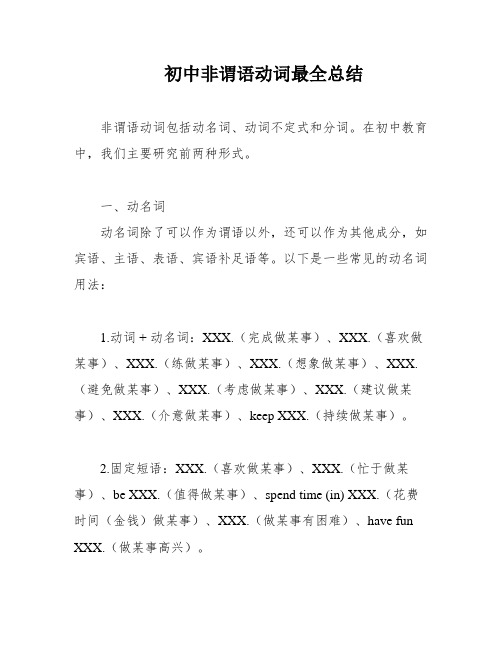
初中非谓语动词最全总结非谓语动词包括动名词、动词不定式和分词。
在初中教育中,我们主要研究前两种形式。
一、动名词动名词除了可以作为谓语以外,还可以作为其他成分,如宾语、主语、表语、宾语补足语等。
以下是一些常见的动名词用法:1.动词 + 动名词:XXX.(完成做某事)、XXX.(喜欢做某事)、XXX.(练做某事)、XXX.(想象做某事)、XXX.(避免做某事)、XXX.(考虑做某事)、XXX.(建议做某事)、XXX.(介意做某事)、keep XXX.(持续做某事)。
2.固定短语:XXX.(喜欢做某事)、XXX.(忙于做某事)、be XXX.(值得做某事)、spend time (in) XXX.(花费时间(金钱)做某事)、XXX.(做某事有困难)、have fun XXX.(做某事高兴)。
3.介词后(on。
in。
of。
about。
at。
with。
without。
for。
from。
up。
by等):be good at doing sth.(擅长做某事)、thank you for doing sth.(感谢做某事)、give up XXX.(放弃做某事)、XXX.(阻止某人做某事)、do well in doing sth.(做某事做得好)、XXX.(害怕做某事)、be XXX.(对做某事感兴趣)、be proud of(以…为自豪)、instead of(代替)、be fond of(喜爱)。
4.to作介词:look forward to doing sth.(期望做某事)、XXX.(与…相比较更喜欢…)、pay n to doing sth.(注意做某事)、be/get used to doing sth.(惯于做某事)、XXX(为…做贡献)。
二、动词不定式动词不定式通常作为动词的宾语、宾语补足语、主语、表语、定语等。
以下是一些常见的动词不定式用法:1.动词 + 不定式:decide to do sth.(决定做某事)、want to do sth.(想做某事)、XXX.(希望做某事)、try to do sth.(尝试做某事)、fail to do sth.(未能做某事)、XXX.(拒绝做某事)、promise to do sth.(承诺做某事)、manage to do sth.(设法做某事)。
非谓语动词用法精讲动词不定式作宾补的句型
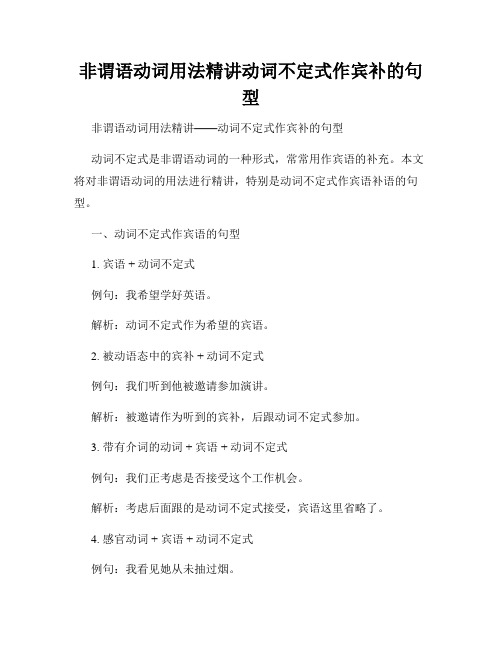
非谓语动词用法精讲动词不定式作宾补的句型非谓语动词用法精讲——动词不定式作宾补的句型动词不定式是非谓语动词的一种形式,常常用作宾语的补充。
本文将对非谓语动词的用法进行精讲,特别是动词不定式作宾语补语的句型。
一、动词不定式作宾语的句型1. 宾语 + 动词不定式例句:我希望学好英语。
解析:动词不定式作为希望的宾语。
2. 被动语态中的宾补 + 动词不定式例句:我们听到他被邀请参加演讲。
解析:被邀请作为听到的宾补,后跟动词不定式参加。
3. 带有介词的动词 + 宾语 + 动词不定式例句:我们正考虑是否接受这个工作机会。
解析:考虑后面跟的是动词不定式接受,宾语这里省略了。
4. 感官动词 + 宾语 + 动词不定式例句:我看见她从未抽过烟。
解析:看见后面跟的是动词不定式从未抽过。
5. 动词 + 宾语 + 带有形容词功能的不定式例句:我听到他长时间地叹气。
解析:听到后面跟的是形容词功能的不定式长时间地。
6. 动词 + 宾语 + 不带to的不定式例句:他看见她离开房间。
解析:看见后面跟的是不带to的不定式离开。
7. 动词 + 宾语 + 带有状语功能的不定式例句:我想尽快完成这个任务。
解析:想后面跟的是状语功能的不定式尽快完成。
二、动词不定式用法注意事项1. 不定式作宾语时,常常省略to,但在某些情况下仍要保留to。
例句:我喜欢跳舞。
(不定式省略to)例句:我希望你能给我一点建议。
(不定式保留to)2. 动词不定式要和前面的宾语保持逻辑上的一致。
例句:她计划去购物。
(购物和计划前的宾语她保持一致)3. 动词不定式中的动词可以用于被动语态和进行时态。
例句:这本书需要被读。
(动词不定式用于被动语态)例句:我正在考虑回家的事情。
(动词不定式用于进行时态)4. 动词不定式与谓语动词之间可以有逻辑上的关系,如目的、结果、原因等。
例句:我喜欢读书以提升自己的知识水平。
(目的)例句:饭店的服务员笑着给我们递上菜单。
(结果)例句:她哭着告诉我她的困难。
英语语法非谓语动词归纳总结

英语语法非谓语动词归纳总结一、单项选择非谓语动词1.All the staff in our company are considering ______ to the city centre for the fashion show. A.to go B.going C.to have gone D.having gone【答案】B【解析】【详解】考查非谓语动词。
句意:我们公司所有的员工都在考虑去市中心看时装表演。
此处consider的意思是“考虑”,后接名词或动名词,co nsidering sth./doing sth“考虑某事或做某事”,故选B。
2.I had as much fun sailing the seas as I now do _with students.A.working B.workC.to work D.worked【答案】A【解析】【详解】考查动名词。
句意:我在海上航行和现在和学生一起工作一样快乐。
分析句子可知,have fun doing sth.做某事很开心,as I now do working with students补充完整为as I now have fun working with students。
故选A。
3.Tsinghua University,________ in 1911,is home to a great number of outstanding figures. A.found B.founding C.founded D.to be founded【答案】C【解析】考查非谓语动词。
句意: 建立于1911年的清华大学是大量杰出人物的母校。
Tsinghua University和found之间是被动关系, 故用过去分词作后置定语, 选C。
4.More TV programs, according to government officials, will be produced _____ people’s concern over food safety.A.to raise B.raising C.to have raised D.having raised【答案】A【解析】略5.When Peter speaks in public, he always has trouble _ the right things to say. A.thinking of B.to think of C.thought of D.think of【答案】A【解析】【详解】考查非谓语动词。
- 1、下载文档前请自行甄别文档内容的完整性,平台不提供额外的编辑、内容补充、找答案等附加服务。
- 2、"仅部分预览"的文档,不可在线预览部分如存在完整性等问题,可反馈申请退款(可完整预览的文档不适用该条件!)。
- 3、如文档侵犯您的权益,请联系客服反馈,我们会尽快为您处理(人工客服工作时间:9:00-18:30)。
非谓语动词中的有关句型(1)动名词作主语的句型1)Doing...+ v. Reading is an art.阅读是门艺术。
Seeing isbelieving.眼见为实。
2) It is + no use, no good (fun, a great pleasure, a waste of time,a bore...)等名词+doing sth.It is no use crying.哭没有用。
It is no good objecting.反对也没有用。
It is a great fun playing football.打篮球很有趣。
It is a waste of time trying to explain.设法解释是浪费时间。
3)It is + useless (nice, good,interesting,expensive等形容词)+ doing sth.It is useless speaking.光说没用。
It is nice seeing you again.真高兴又遇到了你。
It is good Playing chess after supper.晚饭后弈棋挺好。
It is expensive running this car.开这种小车是浪费。
4)There is no + doing...(there is no?表“不可能”)There is no telling what he is going to do.说出他要干什么是不可能的。
There is no saying what may happen.说出将要发生什么是不可能的。
5)There is no use (good/point/sense/harm)+doing sth.做某事没用(不好/意义/重要性)There is no use crying over spilt milk.牛奶洒了,哭也无用。
6)have difficulty /trouble/problem + (in)+doinghave作有解时,后接情感名词(in可省略),再接动名词。
这类词还有trouble, fun, a hard time, a good time.例如:We had difficulty (in) carrying out the plan.我们执行计划有困难。
7)feel like +?名词感觉像动名词?“?想要”?=would like to +原形动词I feel like a newborn baby.我感觉像一个新生的婴儿。
Do you feel like going to a movie?你想看电影吗?I don't feel like studying tonight.今晚我不想读书。
8) spend/waste time doing sth.They spent a lot time (in) making preparations.他们花了许多时间作准备。
9)在require后只能用动名词,不能用不定式,尽管表示被动的意思也要用动名词的主动形式。
This problem requires studying with great care.这个问题需要仔细研究。
10)cannot help doing sth.忍不住(做什么)I cannot help laughing, once I see john in that big trouser.(2)有关分词句型1)在表示感觉和心里状态的动词see,hear,feel,smell,listen(to),notice,observe,smell,watch这类表示感觉的动词之后常跟“宾语+现在分词”的复合结构,这种动词与分词之间的宾语可以是普通名词或专有名词(人各等),也可以是代词宾格(him,us等)。
例如:She smelt something burning and saw smoke rising.她闻到有东西在燃烧并看到有烟升起来了。
I watched them rehearsing the play.我看他们排演戏。
I could feel the wind blowing on my face.我能感觉到风在我脸上吹过。
2)表示“致使”等意义的动词,如:catch,find,leave,give,have,get,set后也可跟上述(1)的结构,有时也可跟过去分词结构。
例如:I caught them stealing my apples.我抓住他们偷我的苹果。
If she catches me reading her diary,she'll be furious.如果她抓住我偷看她的日记,她会愤怒的。
We found him waiting to receive us.我们发现他正等着接待我们。
3)go +现在分词表示“从事…”之意,这时现在分词做主语补语。
go之后所接现在分词均表示短暂而又愉快的户外活动。
如:jogging慢跑,fishing钓鱼,dancing跳舞,skating溜冰,bowling打保龄球,shopping?购物,sightseeing 游览,camping露营。
I’ll go camping tomorrow.我明天去露营。
I’ll go shopping.我去商店。
Would you like to go skating with me?你想和我去溜冰吗?4)be busy + v-ing(现在分词)忙着做…I am busy writing my thesis.我正忙着写论文。
His assistant is busy(in) correcting papers.他的助教忙于批阅考卷。
或者be busy with + n.忙着做某事。
He is busy with his work.他忙着工作。
5)What do you say to + ing分词?(……怎么样?)What do you say to joining us for dinner?和我们一起进餐,你看怎么样?(3)有关动词不定式句型下面这些词组是不定式的习惯用法,只能用不定式形式。
can not help but do, can not but do, cannot choose but do, can do nothing but do, have no choice/alternative to doWhen I consider how talented he is as a painter, I cannot help but believe that the public will appreciate his gift.(4)there be的非谓语形式there be非谓语形式可在句中作主语、的宾语、的状语和定语。
(其中作宾语和状语在1991年和1994年测试过,定语见1996年题10。
)The students expected there to be more reviewing classes before thefinal exams.(作宾语如1991年题30)1)作动词宾语时,通常用there to be结构,而不用there being。
能这样用的及物动词为:expect,like,mean,intend,want,prefer,hate等,如:We don't want there to be any comrades lagging behind,我们不希望有任何同志掉队。
They hate there to be long queues everywhere.他们不愿意处处都要排长队。
We have no objection to there being a meeting here.我们并不反对在这里开会。
It isn't enough for there to be a frost tonight,so I can leave Jim's car out quite safely.(作状语)2)作状语多用there being结构,但若置于介词之后,for用there to be整个介词短语作程度状语,其它多半用there being。
There being nobody else at hand, I had to do by myself.由于附近没有人,我只得独自干了。
(原因状语)It’s too early for there to be anybody up.太早了,还不会有人起床。
(作程度状语)There having been no rain for a long time,the ground was very dry.因为好长时间没下雨了,地面非常干燥。
(原因状语)3)作主语时两种结构都可以,但如是用for引导则要用there to be。
It is not uncommon for there to be problems of communication betweenold and young.老人与年青人之间存在着沟通问题是很常见的。
There being a kindergarten on campus is a great convenience tofemale teachers.幼儿园在校园内对女教师十分方便。
4)作定语。
?There be结构作定语时,定语从句中谓语为there be,there之前的关系代词常常省略。
如:This is the fastest train (that) there is to Nanking.这是到南京的最快一班车。
I must make full use of the time there is left to me and do as muchas I can for the people.我要充分利用我剩下的岁月尽量为人民多做些事。
To tell (you) the truth/believe it or not/lost in thought/suppose…⑥???? Considering/Judging/Generally speaking/supposing…。
